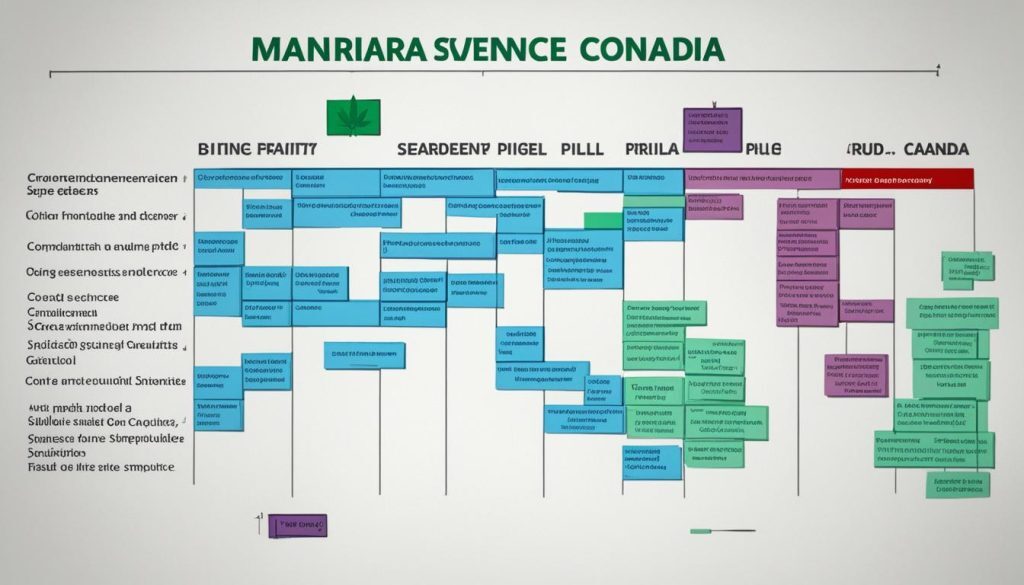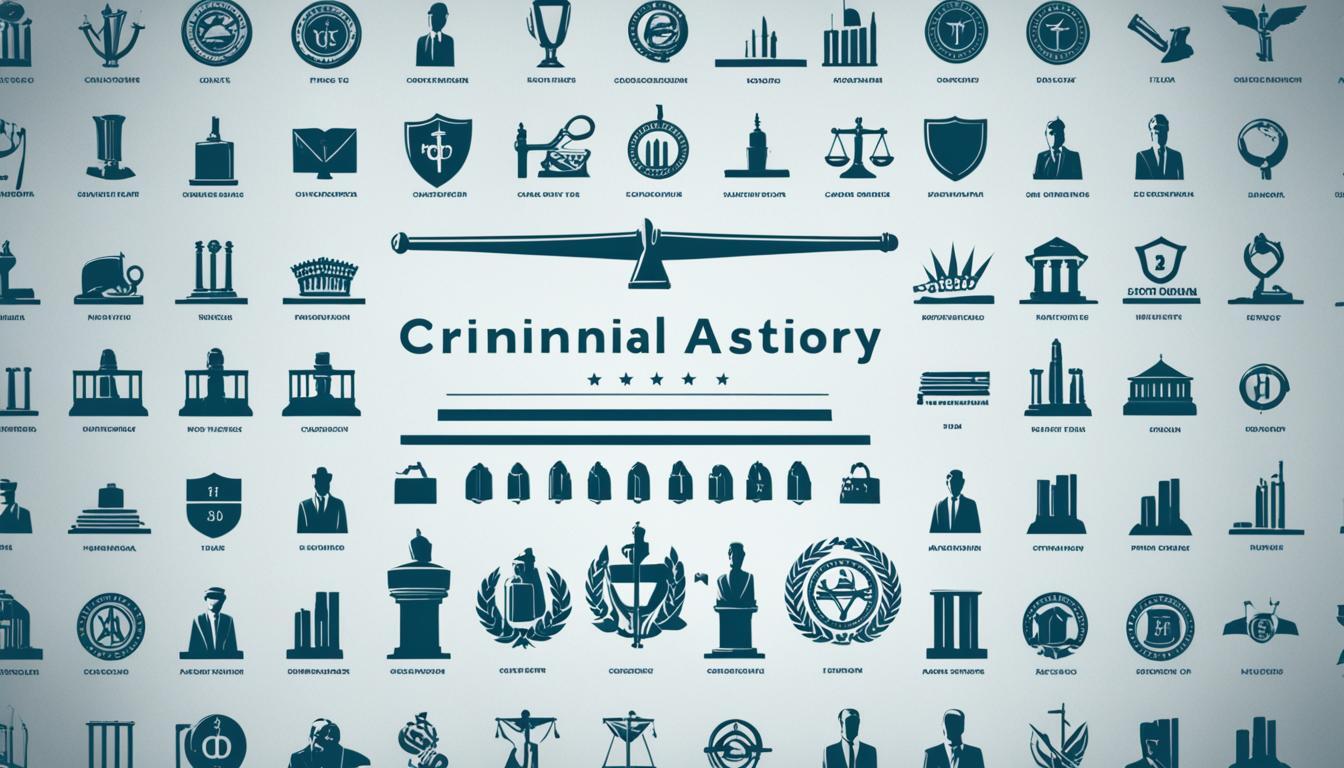Canada Drug Trafficking Thresholds Explained
Did you know that drug trafficking in Canada can result in a maximum sentence of life in prison?
The Controlled Drugs and Substances Act (CDSA) governs drug trafficking in Canada, categorizing drugs into different schedules based on their potential harm. While Canadian law does not specify specific drug threshold amounts that trigger trafficking charges, the quantity of drugs involved, along with other factors, can lead to severe penalties.
Key Takeaways:
- Drug trafficking in Canada can result in a maximum sentence of life in prison.
- The Controlled Drugs and Substances Act categorizes drugs into different schedules based on their potential harm.
- Canadian law does not specify specific drug threshold amounts that trigger trafficking charges.
- Judges have discretion in sentencing, considering factors such as the potential harm, aggravating factors, and previous convictions.
- Mount a strong defence against trafficking charges with Mass Tsang LLP, experienced criminal defence lawyers.
Drug Trafficking Defined Under Canadian Law
Drug trafficking in Canada is defined under the Controlled Drugs and Substances Act (CDSA), which covers various illegal substances and their categorization into different schedules based on their potential harm. The act defines trafficking as selling, administering, giving, transferring, transporting, sending, delivering or offering to do any of these activities with controlled substances.
The quantity of the controlled substance is not specified in the definition, allowing police to lay trafficking charges on any amount involved in these activities. This means that even small quantities of illegal drugs can be subject to drug trafficking charges in Canada.
When it comes to drug trafficking penalties in Canada, the severity of the punishment depends on the schedule of the drug. The CDSA classifies drugs into different schedules, with Schedule I and II drugs carrying the most severe penalties. Convictions for trafficking Schedule I and II drugs can result in a maximum sentence of life in prison.
Other factors such as the type of drug, the involvement of weapons or violence, and previous convictions can also influence the penalties for drug trafficking. These aggravating factors can increase the severity of the punishment imposed by the court.
It is important to note that each case is unique, and judges have some discretion in sentencing. However, sentencing guidelines in Canada aim to deter drug trafficking and protect public safety by imposing significant penalties on those involved in the illegal drug trade.

In summary, drug trafficking in Canada is defined broadly and can encompass any activities involving the sale, transfer, or transportation of controlled substances. The penalties for drug trafficking depend on the schedule of the drug involved and can range from significant prison terms to life imprisonment. It is essential to consult with a knowledgeable criminal defense lawyer to mount a strong defense against drug trafficking charges.
Drug Trafficking Penalties According to Substance Schedule
When it comes to drug trafficking in Canada, the penalties imposed vary depending on the schedule of the drug involved. The Controlled Drugs and Substances Act classifies drugs into different schedules based on their potential harm, with Schedule I and II drugs considered the most serious.

Schedule I and II drugs can only be prosecuted as an indictable offense, and those convicted can face a maximum penalty of life imprisonment. The severity of the sentences reflects the high potential harm associated with these substances.
Schedule III and IV drugs, on the other hand, can be charged as either an indictable or summary conviction offense. When prosecuted as an indictable offense, the maximum penalties are 10 years imprisonment for Schedule III drugs and three years imprisonment for Schedule IV drugs.
If charged as a summary conviction offense, the maximum sentences are 18 months for Schedule III drugs and one year for Schedule IV drugs. These penalties are less severe compared to Schedule I and II drugs, but trafficking in any quantity of controlled substances can still result in significant consequences.
Judges have discretion in sentencing, taking into consideration various factors such as the type and quantity of drugs involved, aggravating factors, and the accused’s criminal history. Trafficking in large quantities of drugs generally results in harsher sentences.
Judges Have Broad Discretion in Sentencing
When it comes to drug trafficking cases in Canada, judges have significant discretionary power in determining the appropriate sentencing for offenders. In the past, mandatory minimum sentences were imposed for certain drug-related offenses; however, these sentences were deemed unconstitutional by the Supreme Court of Canada and subsequently repealed. As a result, judges are no longer obligated to impose prison terms for individuals convicted of drug trafficking.
Despite the absence of mandatory minimum sentences, judges tend to hand down harsher penalties for individuals involved in trafficking larger quantities of drugs. Factors such as the potential harm associated with the substances, the presence of aggravating circumstances like the use of weapons or violence, and a history of previous convictions are taken into account when determining the appropriate sentence.
The purpose of sentencing under the Controlled Drugs and Substances Act is to uphold respect for the law, promote a just and safe society, and provide opportunities for rehabilitation and treatment for offenders. It also acknowledges the harm caused to victims and the community as a result of drug trafficking activities.
Illustrative Example
| Drug | Schedule | Maximum Sentence |
|---|---|---|
| Cocaine | Schedule I | Life imprisonment |
| Marijuana | Schedule II | Life imprisonment |
| Codeine | Schedule III | Up to 10 years imprisonment |
| Alprazolam (Xanax) | Schedule IV | Up to 3 years imprisonment |
It is important to consult with a skilled criminal defense lawyer who specializes in drug trafficking cases to ensure that your rights are protected and to mount an effective defense. At Mass Tsang LLP, we have a team of experienced criminal defense lawyers who can guide you through the legal process, assess the strengths and weaknesses of your case, and work towards the best possible outcome.
Mount a Strong Defence Against Trafficking Charges with Mass Tsang
Facing drug trafficking charges in Canada is a serious matter that requires the expertise of skilled criminal defence lawyers. If you or a loved one has been arrested on drug trafficking charges in the Greater Toronto Area, it is crucial to consult with the experts at Mass Tsang for a free consultation and expert legal representation.
Mass Tsang LLP is a team of experienced criminal defence lawyers based in the Greater Toronto Area who specialize in defending clients against drug charges. With their decades of experience, they can help individuals mount a strong defence against trafficking charges, navigate the complexities of the legal system, and work towards the best possible outcome.
When it comes to drug trafficking penalties in Canada, the consequences can be severe. Canadian drug trafficking laws, including the Controlled Drugs and Substances Act (CDSA), prescribe harsh sentences, including a maximum sentence of life imprisonment. By enlisting the services of Mass Tsang, you can ensure that you have dedicated legal professionals fighting for your rights and working towards minimizing the impact of these penalties.
Don’t face drug trafficking charges in Canada alone. Put your trust in the experienced criminal defence lawyers at Mass Tsang LLP and let them guide you through the legal process, advocate for your rights, and help you achieve the best possible outcome for your case. Schedule a free consultation today and take the first step towards mounting a strong defence.
- The Role of Police in Community Safety & Unity - October 6, 2025
- Quebec Police Officer Salary Insights 2023 - July 13, 2025
- Canada Arrest Protocol: What Police Say Upon Arrest - June 12, 2025




















Post Comment